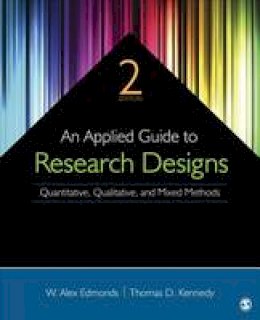
Stock image for illustration purposes only - book cover, edition or condition may vary.
An Applied Guide to Research Designs: Quantitative, Qualitative, and Mixed Methods
W. Alex Edmonds
€ 141.21
FREE Delivery in Ireland
Description for An Applied Guide to Research Designs: Quantitative, Qualitative, and Mixed Methods
Paperback. .
This book covers the most practical and common research designs currently used in educational and the social and behavioural sciences. It will improve readers' ability to conceptualize, construct, test, problem solve and acquire knowledge, all of which are characteristics of scientific inquiry and the creative process required when conducting research.
This book covers the most practical and common research designs currently used in educational and the social and behavioural sciences. It will improve readers' ability to conceptualize, construct, test, problem solve and acquire knowledge, all of which are characteristics of scientific inquiry and the creative process required when conducting research.
Product Details
Publisher
SAGE Publications Inc
Format
Paperback
Publication date
2016
Condition
New
Number of Pages
392
Place of Publication
Thousand Oaks, United States
ISBN
9781483317274
SKU
V9781483317274
Shipping Time
Usually ships in 4 to 8 working days
Ref
99-4
About W. Alex Edmonds
W. Alex Edmonds, PhD, BCB, is currently an associate professor of research at Nova Southeastern University in Davie, Florida. He graduated from Florida State University and received his doctoral degree in Educational Psychology with a minor in Statistics and Measurement. Over the years, Dr. Edmonds has applied his knowledge of research design, measurement, and assessment in both field and laboratory examinations. He has published extensively in a variety of areas such as psychophysiology and educational psychology. His primary interest revolves around applying unique methodological and statistical techniques as a means to exploring the relationship between emotions, physiology and performance in a variety of domains. He also has over 10 years of experience in applying biofeedback in field and research applications. While in graduate school, he conducted his field work with the track and field team at Florida State and started using biofeedback for research and practice during this time. He has utilized biofeedback extensively with various types of athletes for performance enhancement, as well as stress-regulation techniques for individuals with type 2 diabetes and pain management for patients suffering from chronic pain. Dr. Edmonds is certified through the Biofeedback Certification International Alliance in general biofeedback. Tom D. Kennedy, PhD, BCB, is currently an associate professor of research at Nova Southeastern University in Davie, Florida. He received his PhD in Counseling Psychology from the University of Miami and his MA in Clinical Psychology from Southern Methodist University. He has been a faculty member at NSU for five years where he has developed and taught research and statistics courses. He is the Institutional Review Board representative for the School of Education. His clinical experience consists of providing neuropsychological assessments, behavioral medicine interventions, and group therapy in inpatient and outpatient settings, including the following: the University of Texas Southwestern Medical Center, University of Miami Mailman Center for Child Development, Jackson Memorial Hospital, University of Miami Institute for Individual and Family Therapy, and the Dallas County Jail. His research interests include two convergent tracks, one focusing on at-risk children and adolescents and the other exploring biofeedback and other complementary and alternative medicine interventions. He has been the recipient of multiple grants and provides evaluation and grant writing services for various organizations in south Florida. He has published and presented in the areas of juvenile crime, psychophysiology, and research methodology. Dr. Kennedy is a licensed psychologist PY 8307 and is certified through the Biofeedback Certification International Alliance in general biofeedback and maintains a small private practice for children and adolescence.
Reviews for An Applied Guide to Research Designs: Quantitative, Qualitative, and Mixed Methods
This is a very useful, practical, and well-devised textbook.
Micheal Newell The research study examples provided in connection to each research design reflect an additional strength to this text. What I like about this text is that it contains a comprehensive view of designs, without bias regarding one paradigm being better than the other.
Donna Schnorr I find this text to be especially clear in its approach, while the use of examples and sample exercises would be highly effective for practical, in-class learning. Additionally, the text would be an excellent resource as students put together their research designs, and it would likely work well alongside a more theoretical companion text.
Jennifer E. Dalton This text is intellectually stimulating and challenges students to take a comprehensive approach to their understanding of research designs and concepts. I appreciate the high expectations that the authors have for their readers to fully understand the nature and depth of the research process.
Rebekah Cole
Micheal Newell The research study examples provided in connection to each research design reflect an additional strength to this text. What I like about this text is that it contains a comprehensive view of designs, without bias regarding one paradigm being better than the other.
Donna Schnorr I find this text to be especially clear in its approach, while the use of examples and sample exercises would be highly effective for practical, in-class learning. Additionally, the text would be an excellent resource as students put together their research designs, and it would likely work well alongside a more theoretical companion text.
Jennifer E. Dalton This text is intellectually stimulating and challenges students to take a comprehensive approach to their understanding of research designs and concepts. I appreciate the high expectations that the authors have for their readers to fully understand the nature and depth of the research process.
Rebekah Cole
